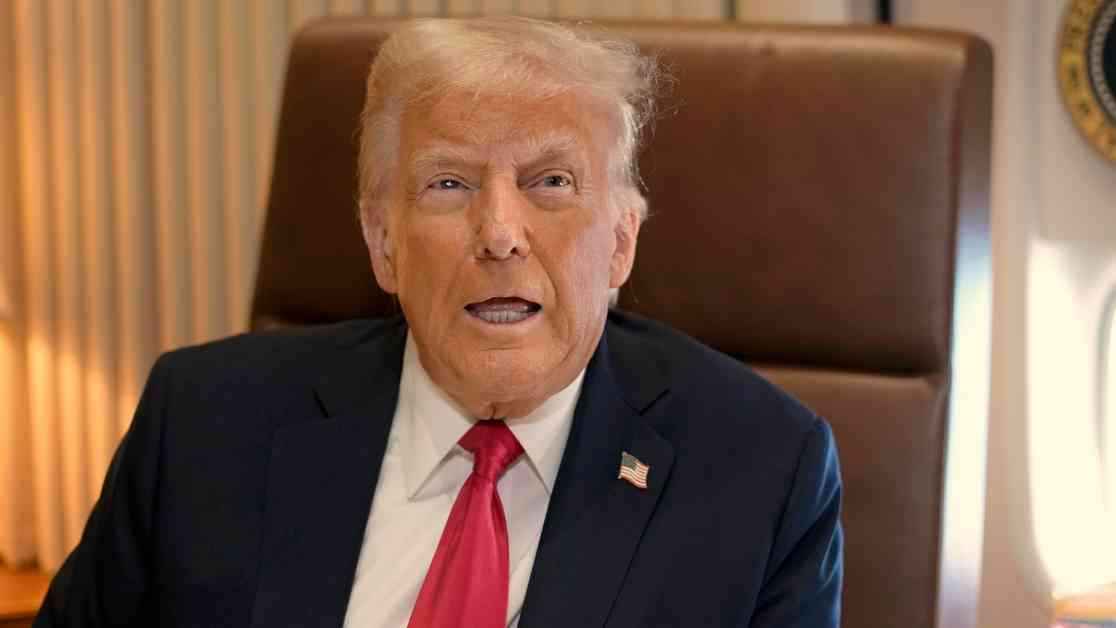President Donald Trump has recently ignited a political firestorm in the Middle East by unveiling his controversial plan for the future of Gaza. The proposal involves relocating close to 2 million Palestinians from Gaza to Jordan and Egypt, in an effort to transform the war-torn region into what Trump envisions as “the Riviera of the Middle East.” The stakes are high as Trump threatens to cut off U.S. aid to Jordan and Egypt if they do not comply with his plan, setting the stage for potentially heated discussions with Arab leaders this week.
Jordan’s King Abdullah is scheduled to meet with Trump at the White House, making him the first Arab leader to engage in face-to-face discussions with the U.S. President since his recent return to power. Jordan, a key player in providing humanitarian aid to Gaza during the Israel-Hamas conflict, is already home to millions of registered Palestinian refugees. However, Trump’s proposal to expand that number significantly has sparked widespread backlash from Middle Eastern leaders, including King Abdullah.
In response to Trump’s announcement, King Abdullah II of Jordan has voiced his strong opposition to the plan, emphasizing the need to halt Israeli settlement expansion and rejecting any attempts to annex land or displace Palestinians. The royal court of Jordan released a statement expressing the King’s concerns, setting the stage for a potential clash of ideologies between Trump and Middle Eastern leaders.
Resistance and Reactions
Despite a flurry of calls and meetings by King Abdullah with the U.N. and other nations supporting Palestinian rights, Trump remains undeterred in his vision for Gaza. In a recent interview, Trump stated that Palestinians relocated from Gaza under his plan would not have the right to return after the region is rebuilt. He defended his proposal by promising better housing and a permanent residence for the displaced population.
Moreover, Trump has hinted at pressuring Jordan and Egypt to comply with his plan, threatening to withhold aid if they refuse to cooperate. Secretary of State Marco Rubio is being dispatched to the Middle East to engage with key leaders in the region, potentially paving the way for further negotiations on the contentious issue. However, Rubio’s stance on the matter remains ambiguous, leaving room for speculation on the alignment between the Secretary of State and the President.
Expert Insights and Analysis
As the situation unfolds, experts have offered differing perspectives on Trump’s proposal for Gaza. While some view it as a strategic bargaining tactic, others believe it has already led to significant damage to the peace process and U.S. credibility. Ahmed Aboudouh, an associate fellow at Chatham House’s Middle East and North Africa Programme, expressed concerns about the negative impact of Trump’s intervention on fragile diplomatic relations in the region.
In contrast, Thomas S. Warrick, a former Department of Homeland Security official, sees potential value in Trump’s proactive approach to addressing the Gaza crisis. Warrick commended Trump for elevating the discussion on postwar Gaza and engaging the United States more actively in finding solutions. However, he cautioned that the plan would need to be refined to be viable and emphasized the challenges of convincing Jordan and Egypt to accept an influx of Palestinian refugees from Gaza.
In the face of mounting tensions and conflicting perspectives, Trump’s proposal for Gaza has undoubtedly stirred up a complex web of diplomatic challenges. As world leaders navigate the delicate balance of national interests and humanitarian concerns, the fate of Gaza hangs in the balance, awaiting a resolution that balances competing priorities and aspirations. The road ahead promises to be fraught with obstacles and uncertainties, as global powers grapple with the implications of Trump’s bold vision for the Middle East.


